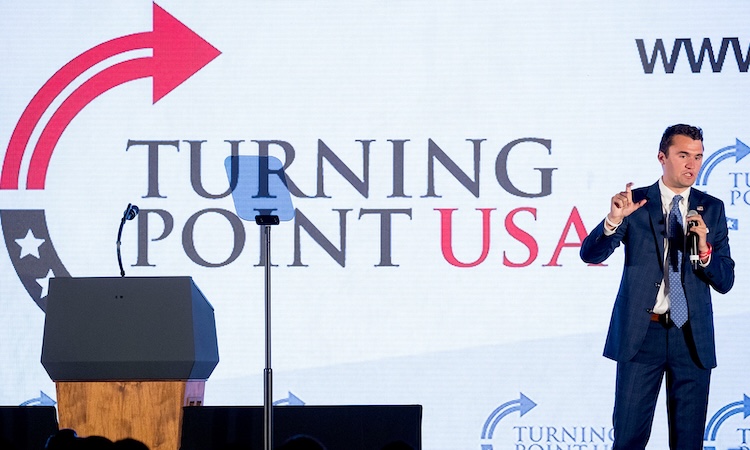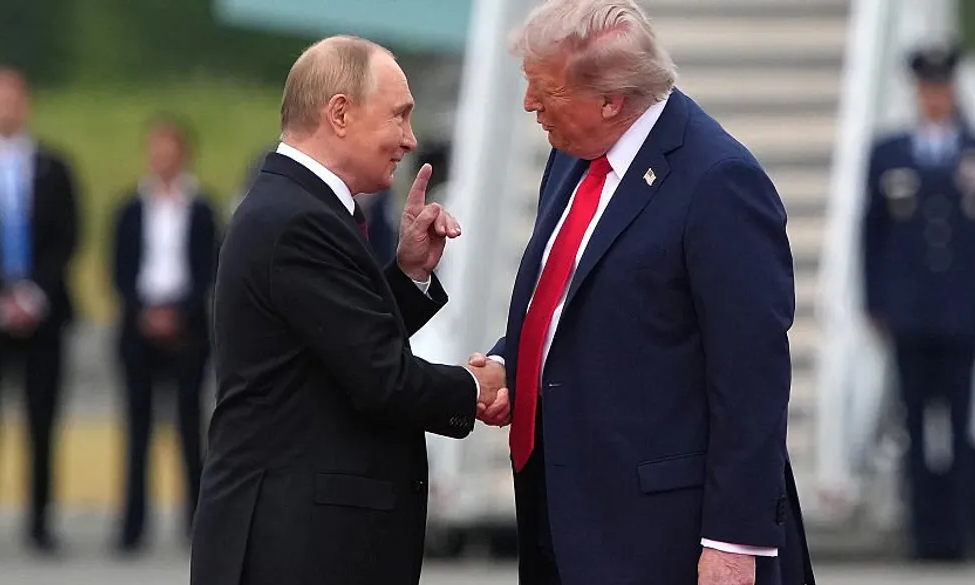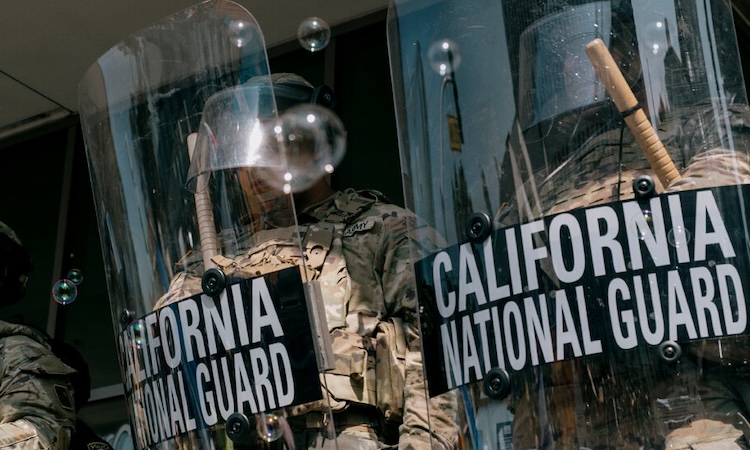The rise of Donald Trump, and his increasingly successful campaign to become the Republican Party’s nominee for the 2016 US presidential election, needs to be explained – a task in which the Republican elite has failed utterly.
The imperialist media portray him as a gold-plated buffoon – a bigot and a racist, characterised by a complete disregard for civility and common decency, and he is undoubtedly all these things. He wants to deport millions of undocumented immigrants, to build a wall along the Mexican border, and, into the bargain, to make Mexico pay for this wall (he never quite explains how he will make Mexico foot the bill).
He has branded Mexicans as rapists and criminals; he wants to ban the entry of muslims into the United States; he has tweeted a quotation from Mussolini and has drawn support from leading racists across the country. But none of these positions of his go far enough to explain his remarkable rise.
As the angry Republican electorate rejects the establishment candidates, a significant section of the party’s elite, instead of blaming itself, blames his rise on the moral failings of those voting for him – certain sections of the US’s white working class. This moral failing, asserts the elite, is the product of welfare dependency, drug and alcohol addiction and family dysfunctionality, for which the white working class is solely responsible.
Paul Ryan, the speaker of the House of Representatives, has warned of a social safety net that becomes “a hammock that lulls able-bodied people to lives of dependency and complacency”.
Mitt Romney, the Republican candidate for the presidency in 2012, in an unguarded moment stated that 47 percent of voters would never support him because they “believe that the government has a responsibility to take care of them”.
The thrust of this kind of reasoning is that the white working class faces a crisis, not of opportunity, but of values, brought about by welfare programmes that make life too easy on slackers.
Trump, on the other hand, when he is not hurling insults or indulging in vulgarities, acknowledges many of the real problems facing the working class instead of lecturing it on its moral failings – an important reason why he is scoring victory after victory in the primaries to choose a Republican candidate for the 2016 presidential election.
Although not much reported by the media, Trump devotes a good portion of his speeches to trade, sending a powerful message about free trade and its effects. It could even be his single biggest concern. He drives home the message that various free trade agreements, such as Nafta, signed by previous administrations, and approved by the Congress, have gutted US industry and destroyed US towns and livelihoods alike, adding that in the event of his being elected president, he would threaten CEOs with steep tariffs if they don’t move back to the US.
He has threatened the lucrative drug industry by saying that he would “start competitive bidding” in this industry. He has criticised the military-industrial complex for forcing the government to buy lousy but expensive aeroplanes thanks to the power of the lobbyists. To the horror of the establishment, he has questioned the US’s continued role in Nato, because, he argues, the Americans can no longer afford it.
As he is a billionaire, and therefore himself free from the power of the lobbyists and the mechanics of corrupt electoral campaign finance, he can, he argues, make ‘good’ deals on behalf of the electorate instead of ‘bad’ ones. There is little chance of that being realised, but the fact that he is expressing these sentiments provides the key to his popularity among the poor white working-class and lower-middle strata.
Just as a map of his support may coordinate with racist Google searches, it coordinates to an even greater degree with areas of de-industrialisation and the consequent despair and destitution that three decades of Washington’s free-market consensus have visited on the vast masses of Americans. Thus, it can be seen that a tale of economic outrage is on the march.
Many of his followers are bigots, but an even greater number are driven by his denunciations of trade agreements and by his promise to stamp hard on the CEOs who have fired workers by the thousands and wrecked their towns and cities, unlike Obama and Hillary Clinton, who defend these pacts.
A study by Working America, an auxiliary of the AFL-CIO trade union federation, found strong support for Trump among white working-class voters in the suburbs of Cleveland and Pittsburgh in December 2015 and January 2016. These voters were motivated by their concern for good jobs and the economy, not by racism.
“People are much more frightened than they are bigoted,” says Karen Nussbaum, the director of Working America, adding that “people are fed up, people are hurting, they are very distressed about the fact their kids don’t have a future” and that “there still hasn’t been a recovery from the recession, that every family still suffers from it in one way or another”. (Millions of ordinary Americans support Donald Trump. Here’s why by Thomas Frank, The Guardian, 8 March 2016)
The Democratic Party establishment generally ignores the working class in the belief that the latter has nowhere to go. Poor people see trade deals, which bring fabulous profits to the wealthy and ruin and misery to the masses; they see generous bailouts of the banking behemoths and guaranteed profits for insurance giants on the one hand, and the repossession of the houses of the less fortunate on the other.
They cannot fail to notice that the banking giants and their complacent political servants have emerged with barely a scratch; that the dividends of globalisation have found their way to the richest one percent, leaving in their wake millions with ruined lives, broken homes, destitution, squalor and degradation. Unable to see through the workings of monopoly capitalism, its victims quite naturally blame everything on the elites, or on their fellow workers in China and other developing countries.
The message of Donald Trump, no matter how shallow and superficial, or how objectionably made, resonates with these people when he says that “we have rebuilt China and yet our country is falling apart. Our infrastructure is falling apart … our airports are, like, Third World”.
There is a powerful backlash against the export of capital. In the final analysis, this is a backlash against the entire mode of existence of imperialism – of finance capital – which cannot exist without this export. Of course, neither Trump nor his followers understand this finer point. All the same, the instincts of the working people are quite correct against a system which deprives them of the means of their livelihoods and makes their lives a hell on earth.
As for the establishment critics of Donald Trump, they find it much easier to blame the voters for their bigotry than look reality in the face – a reality of which Trump is no more than a crude and ugly expression.
The reality is that Trump’s followers are a segment of the population whose participation in the labour market is decreasing year by year, whose life expectancy is declining, who are stuck in blighted neighbourhoods by negative activity and among whom there is a significant rise in disability benefits.
Seventy percent of Americans still claim to be christians. Of these, about 80 million are evangelicals, but only 27 million of them voted in the last election. The surprising fact is that, ignoring their own moral code of conduct, a considerable portion of them are supporting the thrice-divorced, rude, crude and vulgar Mr Trump.
This is another indicator that even among this group of people, economic reality takes precedence over deeply-held religiosity. Once again, what we are faced with is a revolt of the white lower and middle strata against the establishment – and the evangelicals are a core of this revolt. (See Why Donald Trump is tearing evangelicals apart by Michelle Boorstein, The Washington Post, 15 March 2016)
Campaign corruption
What is more, huge numbers of Americans are beginning to see through the racket that passes for the ‘democratic’ political process in the US, where only extreme wealth or access to it gives success in American politics, and where the chief executive of US imperialism – the president – and its legislators are literally bought by Wall Street and the richest families of the land.
In the 2008 election, Obama raised $750m, of which $280m was spent on television advertising. In the current (2016) election, spending on political television advertising is projected to reach $4.4bn for federal races alone, up from $3.8bn in 2012. The next president will have raised and spent a sum close to $1bn.
Most of this money comes from the wealthiest of Americans – a tiny proportion of the population. In January 2015, conservative brothers Charles and David Koch of Koch Industries, along with their political allies, announced their intention to splash out $889m in the 2016 presidential and congressional elections – a sum equivalent to the election spending of the Republican and Democratic parties combined.
According to the New York Times, in the first months of the 2016 presidential cycle, 158 families and the companies they own or control contributed $176m to candidates in both major parties. This $176m accounted for nearly half of all the ‘early money’ raised in the 2016 presidential campaign. “These donors are overwhelmingly white, rich, older and male, in a nation that is being remade by the young, by women, and by all black and brown votes.
“And they reside in an archipelago of wealth, exclusive neighbourhoods dotting a handful of cities and towns.” (The families funding the 2016 presidential election by Nicholas Confessore, Sarah Cohen and Karen Yourish, 10 October 2015)
The candidate who manages to raise the most financial contributions in the year before the actual voting (or, as in the case of Trump, has plenty of his own wealth) usually wins the nomination, as he is able to generate the greatest volume of media advertising. Of the $150bn spent on advertising in the US, 20 percent (ie, £30bn) is accounted for by political advertising. Hillary Clinton has raised $159.9m and Republican Jeb Bush (who has since pulled out of the race) $133m.
No wonder this state of affairs gives rise to public cynicism, reflected in 2014 congressional and state elections that drew an abysmally low voter turnout of 36.9 percent.
Eight of the last ten US presidents were millionaires before they were elected, as are roughly half of the 535 members of the present Congress.
Attempts to block Trump
Attempts by the political and media elite to block Trump’s path to the presidential nomination of the Republican Party have gathered pace. The political and media establishments, which are criminally responsible for colossal amounts of destruction, decadence and degradation, have resolved to join forces against Trump, claiming that he stands for morally abhorrent positions which go beyond the bounds of decency. They agree further that he is personally so repulsive that, if he were to become the president, he would degrade the country and the office of president.
Undoubtedly, many of these accusations are correct, but in most cases his accusers have long practised similar policies, albeit with far less candour.
Five dozen or so extreme right-wingers calling themselves “members of the Republican national security community” have published an ‘open letter’ condemning Trump on the ground that “his own statements lead us to conclude that as president he would use the authority of his office to act in ways that make America less safe, and which would diminish our standing in the world”. As an example of this charge, they cite Trump’s embrace of “expansive use of torture”, which, they say, is “inexcusable”.
The key to this charge is the word ‘expansive’, for the people who signed this letter are not in a position to say that torture by itself is ‘inexcusable’. Indeed, most of them presided over torture while in office or gave vocal support to its practice. Obviously, to use the words of Glenn Greenwald: “they invoke the Goldilocks theory of torture: we believe in torture up to exactly the right point, while Trump is disgraceful because he wants to go beyond that: he believes in ‘the expansive use of torture’”! (Donald Trump’s policies are not anathema to US mainstream but an uncomfortable reflection of it, Information Clearing House, 4 March 2016)
Jumping on the bandwagon, Mitt Romney, in a wildly cheered speech, and turning a blind eye on his own pro-torture stance, denounced Donald Trump for advocating torture.
Most of those signing the open letter are guilty of overseeing or colluding with torture, kidnappings, indefinite detention, war crimes, and illegal war on, and the wanton destruction of, Iraq – with its Abu Ghraib torture centre, millions of deaths and even greater number of internally and externally displaced citizens.
It is clear as daylight that Trump’s advocacy of torture, far from disqualifying him, is actually quite mainstream, and is willingly embraced by the US political, business and military elite, as well as by large sections of the American population. Torture, even if euphemistically christened ‘enhanced interrogation methods’, has been official US policy for years.
Many highly placed officials who presided over torture and defended it – from Condoleezza Rice to John Brennan – continue to be virtually revered in respectable mainstream circles. Besides, Trump rivals Ted Cruz and Marco Rubio (before he dropped out of the race) both refused to rule out a bar on torture techniques if they were elected as president. In view of this, Trump’s openly pro-torture stance does not put him beyond the American pale. On the contrary, it places him firmly within the mainstream of the US establishment.
Michael Hayden, George Bush’s National Security Adviser and CIA chief, expressed outrage at Trump’s suggestion that family members of terrorists should be killed. He asserted that US military personnel would never follow Trump’s orders if these involved committing war crimes such as torturing detainees or killing a terrorist’s family members. On being asked about this, Trump insisted that the military are “not going to refuse. Believe me …”
Pretending to be shocked and outraged by Trump’s statement, even a war criminal such as Ari Fleischer, the torture and war propagandist of the Bush White House, joined the fray, saying: “Trump is wrong when he says the military will do whatever he tells them. They’ll resign before carrying out what they think is an illegal order.”
The truth that Trump is right, however, is proved by going no further back than the 14-year long ‘war on terror’, during which, with a handful of honourable exceptions, there has been no dearth of people in the military, the CIA and those working for private contractors, who have routinely committed the most bestial acts of war criminality.
General Taguba, the military official in charge of investigating war on terror policies, had this to say on this score in 2008: “After years of disclosures by government investigations, media accounts and reports from human rights organisations, there is no longer any doubt as to whether the current administration has committed war crimes. The only question to be answered is whether those who ordered the use of torture will be held to account.”
In 2009, General Barry McCaffrey admitted: “We torture people unmercifully. We probably murdered dozens of them during the course of that, both the armed forces and the CIA.”
The assertion that the US armed forces will defy the Commander-in-Chief if ordered to carry out illegal acts is simply laughable. Indeed, the fate of Bradley Manning and other conscientious objectors has provided a graphic warning to any soldiers who are thinking of refusing such criminal orders.
As to Trump’s proposed killing of family members of terrorists, denials notwithstanding, this has been done routinely for decades, both by the US and by its attack dog in the Middle East, Israel. Time after time, their armed forces have bombed homes on the pretext that some terrorist was hiding in them, in the process killing entire families.
In 2011, a US drone strike assassinated US national Anwar al-Awlaki in Yemen; two weeks later, another drone strike killed his 16-year old son, Abdulrahman, also a US citizen. Although no one claimed that the youngster was in any way involved in terrorist activity, Robert Gibbs, former White House press secretary and a senior adviser to President Obama’s re-election campaign, flippantly justified this blatant murder by saying that he should have “had a more responsible father”.
US drone attacks have killed thousands of innocent people over the last four years. The Obama administration keeps a kill list that it uses to determine whose body should next be blown apart. There is no point in saying that Trump is suggesting something that the sensitive and civilised souls at the helm of the US administration and the US armed forces have never entertained, let alone carried out.
The only difference is that, while Trump says these things openly, crudely and candidly, the US government and military actually routinely puts them into practice while feigning not to. That is merely a difference of style and not of substance.
Other policies
Further, even though Trump advocates the commission of war crimes, he also from time to time advocates policies that are far less militarist and warmongering than those of his GOP (‘grand old party’, ie, Republican) rivals, as well as the warmongering leading Democratic candidate, Hillary Clinton.
Trump undoubtedly annoyed the zionist lobby by suggesting that he would be neutral in the Israeli-Palestinian conflict, for example – a sea change from the traditional US stance of unreserved support for every Israeli crime, for its every act of oppression and repression of the Palestinian people. However, he has gone back on this since then.
Speaking at the annual conference of pro-zionist lobby group AIPAC on 21 March, however, Trump came out unequivocally in support of Israel. The speech he made would have gladdened the heart of the leading zionists in Israel and abroad. In the same speech, he said that on becoming president, his priority would be to dismantle the “disastrous” nuclear agreement with Iran reached by the Obama administration.
He has upset a lot of the elite by saying that the Iraq war was waged on the basis of patent lies. And he has angered a lot of US warmongers by indicating that he would work with Russian president Vladimir Putin, just as the US ruling class is busy demonising the Russian leader and attempting, albeit said unsuccessfully, to isolate him.
Lots of the Republican elite are unhappy with his endorsement of the Obamacare legislation on health.
Racism
Trump is accused of being a racist and a bigot, which sure enough he is, but this doesn’t make him any different from the Republican elite or from a goodly part of its Democratic counterpart. It is just that Trump wears his bigotry on his shirtsleeve, while the Republican elite have generally preferred to practise the same craft by methods more subtle and deceptive.
In the words of Mr Edward Luce of the Financial Times: “For decades key Republican strategists have used a dog-whistle to play on racial fears. It should come as no surprise that someone like Mr Trump would one day swap it for a megaphone.” (Trump’s popularity is icing on a cake that was already baked, 7 March 2016)
Whether Donald Trump or someone else gets the nomination of his party, the demographics of the US electorate have changed so as to almost guarantee victory for the Democratic candidate. African-Americans now constitute 12.9 percent of the US population and Hispanics 17 percent. The Republicans have so offended Hispanics and African-Americans, not to speak of their tirades against women, that they are unlikely to get many votes from these sections of the electorate.
In the last presidential election, Mitt Romney received only 25 percent of the Hispanic vote and a mere 6 percent of the African-American. For the Republican candidate to win the presidency, he has to secure at least 70 percent of the votes of the white electorate – a very difficult target indeed.
There is further trouble brewing in the Republican camp. If Donald Trump doesn’t secure the magical number of 1,237 delegates needed for an outright win to secure his party’s nomination, the Republican convention will declare an ‘open contest’ – a situation in which the grandees of the party could deny the nomination to Trump.
In that event, there is a good chance that the Republican Party would be blown apart into warring factions and make way for the vainglorious Trump to stand as a third-party candidate, thus doubly ensuring the defeat of the Republicans.
Finally, on the fact that Trump is vulgar, rude and possessed of revolting personal characteristics, one can but note that, although all these things have been well known for decades, they have presented no barrier to his integration into the power and celebrity circles of the US, including by those who now suddenly pretend to be offended by him. All he has done is to have taken the vulgarity and decadence of the dying, moribund and parasitic US imperialism to its absurd logical limits.
“Where else,” wrote Mr Philip Stephens, “but the US, with all its brash vulgarity, would you find someone bidding for the nation’s highest office publicly boasting about the size of his penis?” (Trump has friends across the Atlantic, Financial Times,11 March 2016)
He is like a mirror, which reflects their own faces and the system they represent.
We conclude this article with the following words of journalist Glenn Greenwald: “In the past few weeks, there has been a tidal wave of establishment denunciations of Donald Trump … But very few of those denunciations contain any real examination of what accounts for his popularity and appeal: why a message grounded in contempt for the establishment resonates so strongly, why anxiety and anger levels are so high that the ground is so fertile … for the persona he represents.
“That’s because answering that question requires what the US establishment guardians most fear and hate: self-examination.” (Information Clearing House, op cit)
Postscript: A similar rejection of the establishment is also expressing itself in the Democratic camp, in the form of support for Bernie Sanders. That, however, would require another article, which we shall leave to a future issue.















